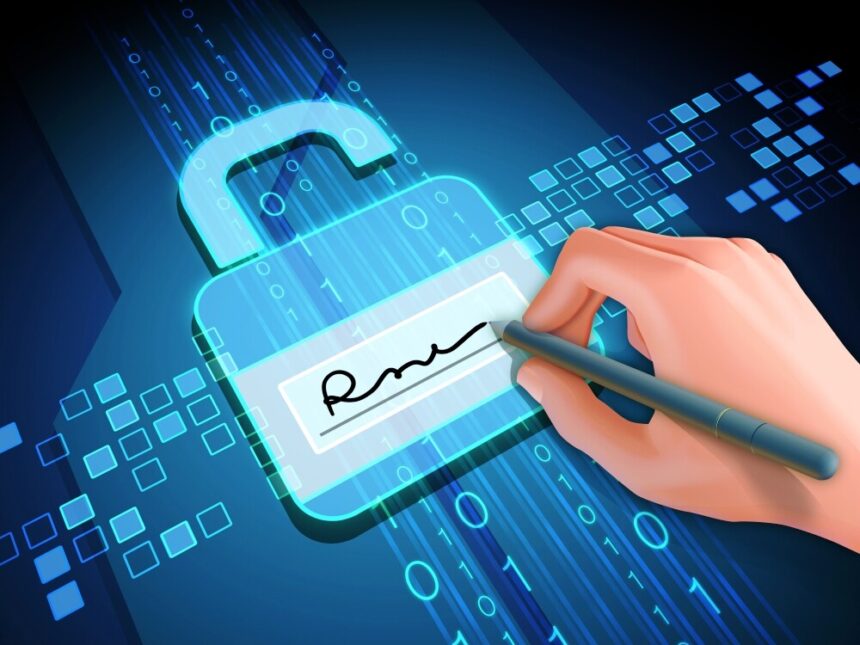Big data is changing the future of professional communications. We have previously discussed the way that organizations use big data to stream communications through Skype and VoIP services. However, big data is also playing an important role in validating documents as well.
Big Data Addresses Security Issues and Other Concerns with Electronic Signatures
Big data is addressing some of the biggest concerns in document processing and authentication. New data mining tools will help with electronic signatures. Hacker Moon addressed the importance of improving security with electronic signatures, especially in the healthcare and financial sectors. Big data developments will make this easier. Big data processes are taking over many prominent industries including healthcare, construction, real estate, and accounting. The traditional paper-based world is a thing of the past as many industries are starting to embrace digital documentation and transactions. Global digital businesses that rely on big data are on the rise. In most cases, you find that specific documents and transactions ought to be signed by many people from different parts of the globe. Having a desktop where they can sign documents makes work easier, saves time and cost. Due to developments in big data, an electronic signature solution is the future and plays a significant role in how we conduct business. However, choosing a particular solution is not an easy task. There are several factors that you ought to consider. Some of them include;
Ensure it?s compatible with the apps you already use
If you are planning to acquire an electronic signature solution make sure it doesn?t change the way you work. Check out if it works with Word, Excel, PDFs, Outlook and other content apps that your company is already using. Some platforms are more compatible with big data solutions than others. Once you?ve determined the electronic signature solution contains all the necessary apps that meet your needs you can ahead and invest in it.
Simplicity
Next to security, one of the biggest benefits of big data is simplicity. Just like in the traditional paper world where signing a document is easy, quick and intuitive, the digital paperless world should be just as easy. When signing it shouldn?t take you more than 10 seconds. The type of electronic signature solution you decide to implement should not require the users to start learning new technologies or constantly ask for assistance from the help desk.
Compliance
There are some basic requirements that any paper-based or electronic solution must adhere to be considered legally binding. Some of the strict standards you should look out for include authenticity, privacy, enforceability, integrity, and non-refutability. Such requirements are general requirements although some industries like finance and pharmaceuticals have other specific needs that they have to comply with.
Ensures you have complete control
The electronic signature solution you settle for should align itself with the specific processes, authentication requirements, user management and technologies of your organization. Once you have complete control over the solution’s implementation, you can run your company in a way that best suits your activities especially by meeting internal regulations, standard operating procedures and governance policies. Likewise, it will allow you to integrate it with the systems that you already have in place.
It should provide safety to your documents
Choose an electronic signature solution that keeps your sensitive documents safe probably inside your IT domain. This prevents your documents from getting saved on external and untrustworthy servers. Don?t gamble with your documents when you can find a solution that ensures your work is not exposed to the risk of fraud and tampering.
Provides multiple signature options
Whichever solution you come up with, it should allow for more than one person to sign the document. With so many electronic signature solutions out there, it is easy to come across one that allows only one signature. Therefore, when the document is signed and sealed there is no possibility of adding another signature. That is not convenient especially because there are certain types of documents that have to be signed by more than one person before they get approved. Make sure your digital signature system has sectional signing for it to be effective.
Should be cost effective
When purchasing an electronic signature solution, it is paramount that you evaluate its total cost of ownership. Some of the things you should be considering include digital certificate renewal fees, deployment and production costs among others. Also, ensure you also take into consideration the paper-related costs before making any decision. A cost-effective solution will not only save you a lot of money but will ensure your company remains profitable in the long-term. Choosing an electronic signature solution might not be easy, but the above tips should give you an idea of what you should be looking for. Don’t be in a hurry if you don’t want to end up making the worst decision for your business. Keep in mind that an electronic signature is supposed to make work easier within your company while improving the overall execution of tasks. Don’t go for something too complicated that will trouble the users as well.
Big Data Leads to Breakthroughs with Electronic Signatures
There are a lot of benefits of big data in the field of communications. One of the most overlooked is in the field of electronic document authentication. Electronic signatures use big data to make this possible.

